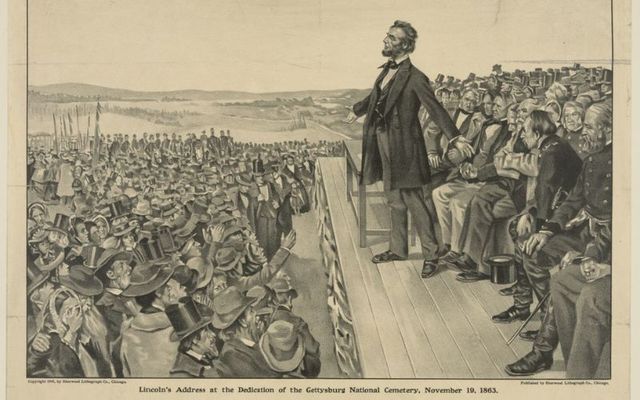Democracy was facing its toughest test 159 years ago and Abraham Lincoln's fine speech at Gettysburg was a turning point that saved it.
It is impossible to read President Lincoln’s Gettysburg Address without feeling chills. It was delivered 159 years ago this week at a time when the relatively new concept of democracy, created in 1776, just 87 years before Gettysburg, was facing its toughest test.
Gettysburg had been the turning point that saved that fragile flower. If Robert E. Lee had broken through, it was on to Washington and a treaty that would have sundered the United States and created a slave-owning southern independent state. The history of America and the world would have changed forever and likely ended democracy as an experiment.
The Irish brigades of New York and Pennsylvania had played heroic roles in stopping the Rebels’ advance. The Pennsylvania 69th was directly in the firing line for Pickett's Charge, the epicenter of the battle, and they stood firm while units around them fled.
Lincoln knew it was time to make a profound statement about what Gettysburg meant. He was not even the featured speaker. He had his copy of his speech hidden in his stovepipe hat.
Only a fraction of the massive crowd could hear him, but he delivered what is arguably the greatest piece of writing ever conceived, created to keep a vast country together with equal treatment for all its citizens and save the democratic form of government.
The opening and closing words are truly profound.
"Fourscore and seven years ago our fathers brought forth, on this continent, a new nation, conceived in liberty, and dedicated to the proposition that all men are created equal...that we here highly resolve that these dead shall not have died in vain, that this nation, under God, shall have a new birth of freedom, and that government of the people, by the people, for the people, shall not perish from the earth.”
We know of an Irishman who was there at Gettysburg. Damian Shields, the great historian of the Irish contribution to the Civil War, noted that in April 1938, The New York Times and Gettysburg Times reported news of the death of a 96-year-old veteran of the American Civil War.
The Gettysburg newspaper covered the story with the headline Vet Dies; Heard Lincoln.
The New York Times offered the most detailed report:
MICHAEL F. GAFFNEY, Civil War Veteran Who Heard Lincoln at Gettysburg
Special to the New York Times
West Orange, N.J., April 3: Michael F. Gaffney, 96-year-old veteran of the Civil War, died here last night at the home of his daughter, Mrs. William Conner of 28 Llewellyn Avenue, after a week’s illness. Born in Dublin, Ireland, he came here as a child and at 20 enlisted in a Pennsylvania regiment, with which he fought at Antietam, Bull Run, second battle; Gettysburg and the Wilderness. He heard Lincoln’s Gettysburg address.
He heard Lincoln at Gettysburg. What an epithet!
Michael Gaffney surely knew he was in the presence of greatness. The world would soon grasp just how great.
It happened 153 years ago this week. We all should give profound thanks.
Here the actor Jeff Daniels reads Abraham Lincoln's "Gettysburg Address":
* Originally published in November 2018. Updated in November 2024.




Comments